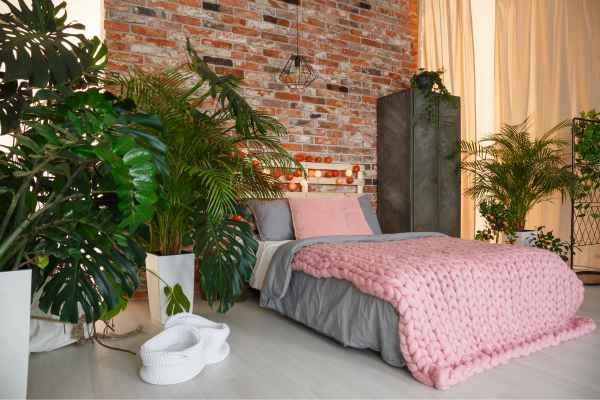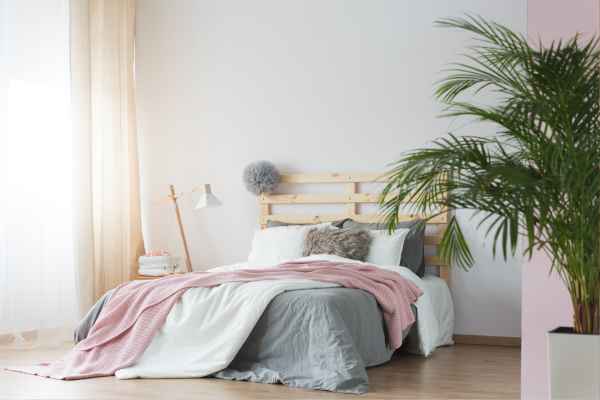Feng Shui, the ancient Chinese art of harmonizing one’s environment, plays a crucial role in bedroom settings. Its basic principles focus on balancing the flow of energy, or chi, to promote health, happiness, and prosperity. The bedroom’s atmosphere is especially important as it’s a space for rest and rejuvenation. Proper arrangement and thoughtful selection of colors, furniture, and decor, according to Feng Shui, can significantly influence sleep quality and overall well-being. Understanding and applying these principles can transform a bedroom into a serene, balanced haven that nurtures peace and harmony.
Understanding the Role of Plants in Feng Shui

Plants play a symbolic and functional role, enhancing the flow and quality of energy, or chi, in a space. They symbolize growth, health, and prosperity, bringing the vibrancy of the natural world indoors. Plants with round leaves are often preferred as they represent a smooth and positive energy flow. Placed correctly, they can balance the elements in a room, encouraging tranquility and well-being. For instance, positioning plant in the east can promote health, as this direction is associated with the wood element. By understanding the symbolism and energy attributes of plant, one can effectively use them in Feng Shui to create a harmonious and nurturing bedroom environment.
Best Plants for Bedroom Feng Shui

Certain plants are particularly beneficial. The Peace Lily, with its serene white blooms, symbolizes tranquility and purifies the air, fostering a peaceful atmosphere. Jasmine, known for its sweet fragrance, is believed to enhance romance and strengthen relationships, making it ideal for a couple’s bedroom. Lavender, with its soothing aroma, is renowned for encouraging relaxation and improving sleep quality, essential for a restful bedroom environment. Bamboo, representing growth and resilience, is also a popular plant, as it’s thought to bring good luck and fortify personal growth. These plants not only enhance the bedroom’s aesthetic but also contribute positively to its energetic balance.
Placement Strategies for Plants in Bedrooms

Strategic placement of plants in the bedroom according to enhances energy flow and balance. It’s recommended to position plant in areas where they can activate positive energy, such as near windows or in corners where chi may stagnate. However, it’s crucial to avoid placing plant in specific zones, like directly beside the bed or in the love and marriage area of the room, as they can disrupt the room’s energy and impact rest or relationships. Mindful positioning, in harmony with principles, ensures that plants contribute positively to the room’s atmosphere and energy balance.
Balancing the Five Elements with Plants

Balancing the five elements with plants enhances harmony in a space. Plant inherently represent the Wood element, symbolizing growth and vitality, and can be complemented by water features or blue accents to introduce the Water element, denoting flow and renewal. Earthy tones or clay pots can represent the Earth element, providing stability and nourishment. To introduce the Fire element, indicative of passion and high energy, choose plants with red flowers or use fiery accents. Lastly, incorporating metal elements, like white flowers or silver plant pots, brings clarity and precision, representing the Metal element. This balanced integration cultivates a harmonious and energetically aligned environment.
The Significance of Plant Colors in Feng Shui

The colors of plants hold significant meanings. Green, the most common color in plant, symbolizes growth and healing, promoting rejuvenation and renewal in the living space. Pink plant or flowers are believed to foster love and happiness, making them ideal for enhancing the romantic area of a bedroom. Blue, though less common in plant, is associated with calmness and wisdom. Incorporating blue elements or plant can contribute to a sense of tranquility and encourage intellectual growth. Understanding the significance of these colors helps in selecting plants that not only beautify the space but also align with desired energies.
Plants to Avoid in Bedroom Feng Shui

In bedroom, certain plants are best avoided due to their energy implications. Cacti and another spiky plant, while interesting in appearance, are believed to emit negative energy, potentially causing unrest and conflict. Large plant can overwhelm a bedroom’s energy, especially if placed too close to the bed, overpowering the room’s tranquility. Dried plant, although sometimes aesthetically pleasing, are considered to hold stagnant energy, which can hinder the flow of positive chi and affect relaxation. Choosing the right plants for the bedroom in Feng Shui is about creating a harmonious and nurturing environment, free from disruptive energies.
Feng Shui Tips for Plant Care

In Feng Shui, proper plant care is crucial as it directly affects the energy they bring into your space. Regular watering and care are essential to keep plants vibrant and thriving, symbolizing growth and positive energy. It’s important to avoid neglect; a decaying or withered plant is believed to attract negative chi, impacting the room’s harmony and the occupant’s well-being. Ensuring plant remain healthy and robust not only contributes to the aesthetic appeal of your space but also maintains the flow of good energy, essential for a balanced and harmonious environment. Mindful care of your plants reflects attentiveness to your own personal growth and environment.
Incorporating Artificial Plants

Incorporating artificial plants in your space can be beneficial when real plant aren’t a practical option due to maintenance or lighting constraints. However, it’s essential to ensure that these artificial plant align with principles. Choose ones that mimic the energy of real plant, maintaining the balance and harmony of your surroundings. Pay attention to the quality and appearance, selecting artificial plants that look lifelike and complement your Feng Shui goals. By thoughtfully incorporating artificial plant, you can enhance the positive energy in your environment and create
Addressing Air Quality and Natural Elements
Plants play a dual role in addressing air quality and natural elements in the bedroom. Firstly, they act as natural air purifiers, filtering out toxins and improving indoor air quality, promoting better health and sleep. Secondly, they enhance the room’s natural energy by bringing in the vitality of the outdoors. The combination of improved air and a connection to nature contributes to a more harmonious and rejuvenating bedroom environment. These benefits make the inclusion of plants a valuable addition to any bedroom, in line with both health and principles.
The Role of Pottery and Plant Holders
Pottery and plant holders play a significant role in enhancing the Feng Shui of indoor plants. Material and color choices should align with the elements associated with the plant and the specific area. For example, earthy-toned pottery complements the Earth element, providing stability. The shape and design of plant holders are also important, as rounded shapes symbolize harmony and flow, while square or angular designs represent stability. By carefully selecting pottery and plant holders that harmonize with the plant and principles, you can maximize the positive energy and aesthetic appeal of your indoor greenery.
Integrating Plants with Other Feng Shui Bedroom Elements
Integrating plants with other bedroom elements is key to achieving a harmonious space. Furniture placement should allow for the flow of energy around the plant, ensuring they are not obstructed. Consider matching plant colors with your room’s color scheme to enhance the desired energy. Lighting and mirrors can be strategically positioned to reflect the plants, increasing their presence and impact on the room’s chi. By seamlessly integrating plant with these elements, you create a balanced and energetically aligned bedroom that promotes well-being and serenity.
Overcoming Challenges in Small or Shared Spaces
Overcoming challenges in small or shared spaces with involves thoughtful solutions. In limited spaces, opt for smaller plants that fit well, such as succulents or bonsai trees. Utilize vertical space with hanging plant to maximize the room’s energy flow. In shared bedrooms, choose plants that promote harmony and balance, like peace lilies or snake plants. These solutions ensure that even in constrained or shared environments, plant can be integrated effectively, enhancing the room’s energy and aesthetics while respecting personal boundaries.
Which plants are recommended for bedroom Feng Shui?
- Some recommended plants for bedroom Feng Shui include:
- Peace Lily: Known for its air-purifying properties and peaceful energy.
- Snake Plant: Helps to absorb toxins and releases oxygen at night, promoting better sleep.
- Lavender: Known for its calming fragrance, which can promote relaxation and better sleep.
- Bamboo Palm: Filters indoor air pollutants and brings a tropical vibe to the bedroom.
- Aloe Vera: Known for its air-purifying properties and ability to emit oxygen at night.
Conclusion
Integrating plants into your bedroom offers a multitude of benefits, from improved air quality to enhanced energy flow and aesthetics. By understanding the symbolism, placement, and care of plant, you can create a harmonious and rejuvenating space. It’s important to strike a balance that aligns with your personal preferences and principles. We encourage you to experiment, explore, and adapt these principles to your unique style, ultimately creating a bedroom that nurtures both your well-being and the positive energy within.
